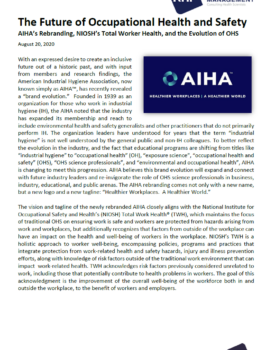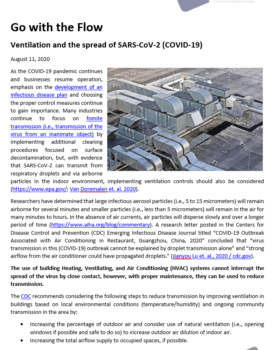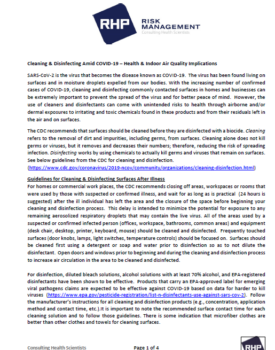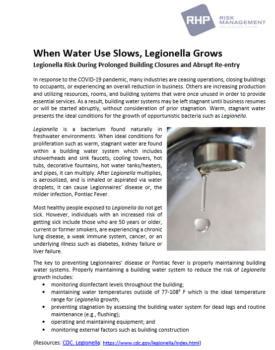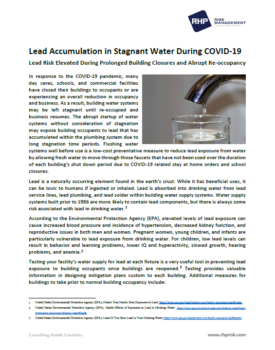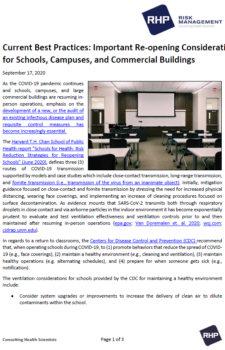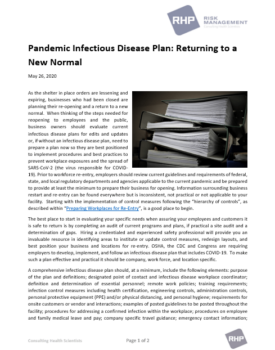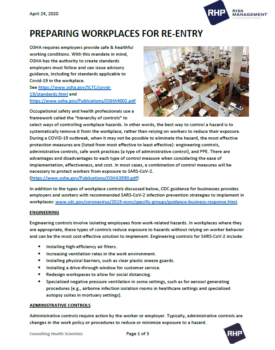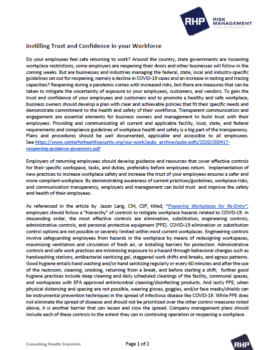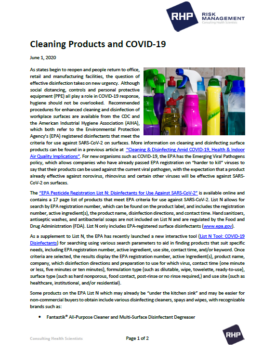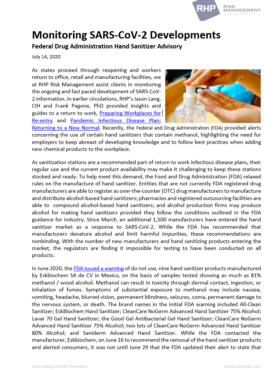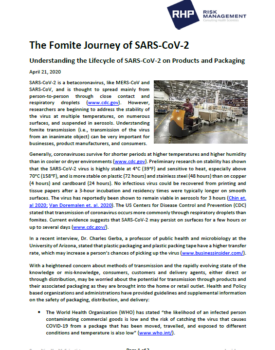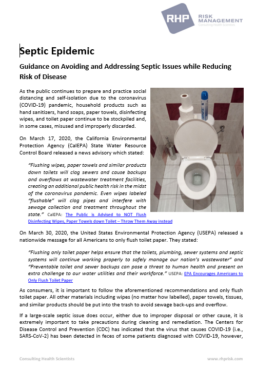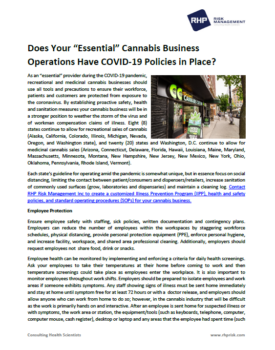(866) 481-8188
Call to Speak with a Specialist
RHP’s Return to Work and Workplace Safety Consulting
RHP’s Certified Industrial Hygienists, Health Scientists, and Certified Safety experts employ their experience and training to advise and guide industry and business leaders in navigating the uncertainties and challenges presented during and after a pandemic such as a coronavirus disease (COVID-19).
RHP utilizes knowledge and expertise combined with our experience interpreting and incorporating the regulations and guidance of Federal, State, and local agencies, leading Public Health and institutional resources, to facilitate client responses to the rapidly evolving pandemic concerns of COVID-19 by developing a return to work / infectious disease plan that fits the client’s specific and workplace driven needs in practical and manageable programs and plans.
As vaccines become available and community disease transmission decreases, RHP services will influence post-pandemic critical risk decisions about when and how to modify the current mitigation strategies.
RHP works in collaboration with clients to assess and develop health and safety management plans to protect their most vital resources – their workforce, their clients and their reputation. We evaluate workplaces, the work process, and workforce tasks to provide a safe and healthy return to work plan that may include engineering controls, administrative controls, and personal protective equipment (PPE).
What Ways Can Employers Protect Their Workers During a Pandemic?
The Occupational Safety and Health Association (OSHA) COVID-19 Guidance and the Centers for Disease Control and Prevention (CDC) provide employers with basic steps they can implement to prevent and slow the spread of COVID-19 within the workplace which include developing an infectious disease plan; conducting a thorough hazard assessment and implementing basic infection prevention measures; developing policies and procedures for prompt identification and isolation of sick people, if appropriate; developing, implementing, and communicating about workplace flexibilities and protections; implementing workplace controls and training employees; and continuing to follow existing OSHA standards to protect workers and provide a safe and healthy workplace. In addition, employers should monitor Federal, State, and local public health communications regarding COVID-19 regulations, guidance, and recommendations and communicate these updates with employees.
Insufficient COVID-19 risk reduction strategies can lead to numerous consequences including a facility-wide outbreak with possible negative health outcomes, costly business shutdowns, filing of COVID-19 related legal claims against employers and business owners by employees and/or employee family members such as workplace safety and health, paid leave, WARN Act, ERISA, employee privacy, worker classification, disability accommodation, and discrimination claims. The consequences underscore the need for employers to have a defined, clear, achievable, and transparent infectious disease plan.
Our Customized, Site-Specific COVID-19 Risk Reduction Strategies.
Customized, site specific COVID-19 risk reduction strategies are essential and effective to reduce the risk of virus transmission and provide organizational benefits including employee confidence that returning to work is safe, improving productivity and maximizing profitability by optimizing operations and building occupancy within current pandemic restrictions, and documenting implementation of best‐practices and defensible processes.
By following current best-practice infection prevention, return to work, and safety management guidance from Federal, State, local, scientific, educational, and professional organizations such as the CDC, OSHA, United States Environmental Protection Agency (USEPA), Illinois Department of Public Health (IDPH), AIHA (backtoworksafely.org), the Harvard T.H. Chan School of Public Health, and American Society of Heating, Refrigerating, and Air-Conditioning Engineers (ASHRAE), combined with current organization and site specific operations, successful customized COVID-19 risk reduction strategies can be implemented to protect workers and provide a safe and healthy workplace.
In the following subsections, briefly share what available federal guidance currently recommends as best practices for staffing, respirator fit testing, ventilation testing, cleaning, dealing with sick workers, etc. Then, go further into detail about your services provided and specifically how you can address that for clients.
Post-Pandemic Solutions: Consulting Guidance on Critical Risk Decisions – When & How to Modify Current Mitigation Strategies
As businesses resume or plan to resume operations during or following the COVID-19 pandemic, emphasis on the development of a new, or the audit and modification of an existing infectious disease / return to work plan and requisite control measures, has become increasingly essential. The White House Guidelines for Opening Up America Again and the “CDC Activities and Initiatives Supporting the COVID-19 Response and the President’s Plan for Opening America Up Again” provides employers with guidance for responding to COVID-19 based on current level of transmission / impact and healthcare capacity at the State and local level. RHP works closely with clients to provide timely and accurate best-practice COVID-19 risk reduction strategies to assist businesses with necessary modifications of mitigation strategies throughout the evolution of the pandemic.
Risk Assessments: Regulatory Compliant and Industry Best Practice
The CDC currently recommends conducting a thorough hazard assessment of the workplace in order to identify potential workplace hazards related to COVID-19 and OSHA provides guidance on conducing a risk assessment to determine the level of risk exposure to SARS-CoV-2 based on “industry type, need for contact within 6-feet of people known to be, or suspected of being, infected with SARS-CoV-2, or requirement for repeated or extended contact with persons known to be, or suspected of being, infected with SARS-CoV-2.”
In addition to assisting with a risk and hazard assessment of workplace hazards related to COVID-19, RHP has conducted numerous human health risk assessments of chemical, biological, and physical hazards to assist businesses with regulatory compliance and industry best practice.
Development of Updates to Emergency Response Plans and Pandemic Disease Policies
The CDC states that “The whole community (e.g., individuals, families, communities, businesses, and jurisdictions) needs to plan for disasters and emergencies, and the disruptions that often result”. To make emergency response plans and pandemic disease policies effective and practical, these programs should be company, work force, and location specific and should be tailored, adaptable, and updated to address the changing landscape of specific business operations, locational differences, Federal and State requirements and updates, work activities, and employee concerns.
RHP’s trained public health and scientific professionals can provide detailed emergency preparedness assistance for businesses following Federal guidance such as the CDC National Institute for Occupational Safety and Health (NIOSH) guidance for emergency preparedness and protecting building environments from airborne chemical, biological, and radiological attacks and Ready.gov preparedness planning for your business. In addition, RHP continues to monitor, assemble, and assess evolving information on the current COVID-19 pandemic and can assist with the development or conduct a third-party audit of your current pandemic disease policies.
Return-to-Work Health & Safety Plans and Reopening Schedule Assistance
Developing and updating a carefully designed COVID-19 return to work plan and reopening schedule is essential to protecting workers and providing a safe and healthy workplace. The CDC “Interim Guidance for Businesses and Employers Responding to Coronavirus Disease 2019 (COVID-19)” and the “Resuming Business Toolkit” provides detailed guidance to assist employers in slowing the spread of COVID-19 and lowering the impact in the workplace for non-healthcare settings. For healthcare settings, the CDC provides specific return to work guidance for healthcare professionals.
RHP, while following reliable and recognized authoritative resources and recommendations, work closely with clients to develop a custom return to work plans and assist with development and implementation of a defensible reopening schedule which provides comfort and assurance needed to return to the workplace, protecting workers, clients, and customers from the risk of infection, and strengthen your company brand and reputation.
Observational Assessments: Hygiene, Masking, Physical Distancing
The CDC advises three (3) important behaviors to slow the spread of COVID-19 include wearing a mask to protect yourself and others, stay at least 6-feet away from others who don’t live with you and avoid crowds, and wash your hands with soap and water for twenty (20) seconds or use hand sanitizer with at least 60% alcohol.
RHP can provide employee training and third-party independent observational assessments of COVID-19 risk reduction practices to confirm proper execution of current best-practice recommendations provided by Federal, State, and local authorities as well as within business-specific COVID-19 return to work / infectious disease plans.
Audits and Checklists to Assess Current Practices vs Best Practice Guidance from Authoritative Information Sources
As described in an EHS Today article titled “Who Is Auditing Your Safety Auditors?”, the Board of Environmental, Health & Safety Auditor Certifications “Standards for the Professional Practice of Environmental, Health and Safety Auditing” provides the following recommendations regarding auditing independence:
- EHS auditors should be free from personal or organizational bias, and internal or external influences on their judgment or authority, whether implied or direct.
- Conflicts of interest should be communicated to the appropriate personnel.
- Objective auditors should base findings on observed, measurable and verifiable evidence.
- Internal EHS audit functions should have a reporting relationship to the board of directors that is independent of the “auditee.”
RHP provides independent, objective auditing and checklist assessment of current COVID-19 risk reduction practices versus industry best practices and can provide timely, trusted, evidence-based, and customized recommendations for updates of programs and procedures. Independent audits provide increased employee and customer confidence that the workplace is safe.
N95 Respirator Fit Testing and PPE Evaluations
OSHA has comprehensive PPE standards (in general industry, 29 CFR1910 Subpart I) which identify requirements for the use of gloves, eye and face protection, and respiratory protection. When respirators such as N95 respirators are necessary to protect workers or where employers require respirator use, employers must implement a comprehensive respiratory protection program in accordance with the Respiratory Protection standard (29 CFR 1910.134).
RHP’s Certified Industrial Hygienists, Health Scientists, and Certified Safety experts can conduct PPE evaluations and rapid fit-testing onsite following current regulatory procedures for site-specific available PPE, as well as train designated person(s) within your staff to conduct respirator fit-testing in-house moving forward, should brand availability change.
Ventilation Testing to Measure Existing Conditions and Compare to Recommendations for Reduced Risk of Virus Transmission
As evidence mounts that SARS-CoV-2 transmits through respiratory droplets in close contact and via airborne particles in the indoor environment, it has become increasing prudent to evaluate and test ventilation effectiveness and ventilation controls. AIHA (backtoworksafely.org), the Harvard T.H. Chan School of Public Health, and ASHRAE provide detailed guidance on reducing the risk of COVID-19 using engineering controls such as ventilation.
A research study by Morawska et. al. titled “How can airborne transmission of COVID-19 indoors be minimized?” provides the following key ventilation associated recommendations to reduce airborne transmission of COVID-19:
- Remind and highlight to building managers, administrators, and infection control teams that engineering controls are effective to control and reduce the risks of airborne infection.
- Increase the existing ventilation rates (outdoor air change rate) and enhance ventilation effectiveness – using existing systems.
- Eliminate any air-recirculation within the ventilation system and supply fresh (outdoor) air.
- Supplement existing ventilation with portable air cleaners, where there are areas of known air stagnation, changes in interior spaces, or isolate high patient exhaled airborne viral loads. Adequate replacement of the filters in the air cleaners and their maintenance is crucial.
- Avoid over-crowding.
RHP is certified to deliver veriDART® by SafeTraces, the only liquid aerosol-based solution for verifying ventilation and filtration efficacy, leveraging aerosol tracers that safely mimic pathogen mobility and exposure. RHP’s ventilation validation testing services which include determination and validation of filtration efficacy and building air exchange rates for COVID-19 risk reduction and determination of site-specific building aerosol transmission risks using a safe airborne surrogate can benefit clients by reducing the risk of an outbreak, improving productivity and maximizing profitability by optimizing operations within current pandemic occupancy restrictions, strengthening program efficiency, and aligning current system performance with best practices.
Surface Testing to Evaluate Cleaning Protocols; Validate Efficacy of Janitorial Services
Although evidence suggests that the spread of SARS-CoV-2 from touching surfaces in not thought to be the primary mode of transmission, research has shown that the virus may persist on surfaces, similar to Rhinovirus and Influenza, and the CDC states that “a person may get COVID-19 by touching the surface or object that has the virus on it and then from touching their own mouth, nose, or eyes”.
RHP experts can conduct surface testing to validate COVID-19 cleaning and disinfection procedures involving ATP, microbial, and RT-qPCR surface testing. Evaluation of cleaning and disinfecting efficiency can ensure the correct cleaning products (“EPA Pesticide Registration List N: Disinfectants for Use Against SARS-CoV-2”) are being used properly and thorough cleaning techniques are being followed, reduce the chance of workplace associated infections, and increase trust from employees and the public they are in a safe environment.
New Cleaning or Risk Control Processes
When implementing any new control measures such as enhanced cleaning procedures or HVAC system upgrades, independent validation of these measures provides confidence that updated controls provide successful COVID-19 risk reduction and infection prevention. The CDC states that “The most effective controls are those that rely on engineering solutions, followed by administrative controls, then PPE. PPE is the least effective control method and the most difficult to implement. Worksites may have to implement multiple complementary controls from these columns to effectively control the hazard.”
RHP experts can provide an unbiased, independent, and defensible hazard assessment and validation of COVID-19 risk reduction strategies to instill confidence and provide documentation that new controls are successful in reducing the risk of COVID-19 transmission.
Employee Training: In-Person or Web-based Training Platform
The CDC highlights the importance of “communicating supportive workplace policies clearly, frequently, and via multiple methods.” This can be accomplished by training employees and providing supplemental documentation such as checklists or focused reminders on how to implement any new policies aimed at reducing the spread of COVID-19.
RHP professionals can provide in-person training or develop a customizable web-based training platform in multiple languages to train employees on new infectious disease / return to work policies aimed at reducing the spread of COVID-19 and document successful completion of training courses. Increased communication and easy access to training materials allow employers to feel confident that employees are aware and successfully implementing any new procedures.
How RHP’s Planning and Assessment Protects Your Workforce and Benefits You
Businesses and schools continue to search for COVID-19 risk reduction and transmission solutions based on scientific and professional best practice guidance and RHP continues to work closely with clients to provide defensible guidance and identify customized solutions to maintain a healthy indoor environment. The following case study highlights RHP services as well as positive outcomes gained by following a proactive COVID-19 risk reduction and infection prevention approach.
On October 23, 2020, RHP conducted an on-site assessment of existing ventilation conditions within a Milwaukee, Wisconsin High School. The school, which is approximately 124,064 gross square feet, contains four mixed-use floors which include a cafeteria, maintenance areas, classrooms, common hallways, laboratories, teacher lounges, a gymnasium, and an auditorium theater. The school’s ventilation system was divided into three (3) sections (or zones) of the building, one (1) ventilation system for each zone.
Based on the information gathered while onsite, results of ACH calculations, and best-practice guidance, RHP provided a number of specific and practical recommendations for the school to follow such as filter replacement, increasing the amount of outside air, and increasing the number of stand-alone HEPA filtration units. In addition, RHP provided qualified and trusted mechanical, engineering, and construction referrals if the school opted to make significant changes to the building and/or HVAC system. By making these changes, the school now has confidence that the ventilation system is aligned with current best practice guidance established by organizations and experts in the field of public health sciences for reducing the risk of virus transmission.
Rice et. al. (2020) in a CDC published article titled “Estimated Resource Costs for Implementation of CDC’s Recommended COVID-19 Mitigation Strategies in Pre-Kindergarten through Grade 12 Public Schools — United States, 2020–21 School Year” found that the estimated cost per pre-kindergarten through Grade 12 student for implementation of COVID-19 mitigation strategies range from a mean of $55 (only materials and consumables) to $442 (materials and consumables, additional custodial staff members, and potential additional transportation). The costs of these mitigation efforts likely outweigh the cost of closure which support the continued effort to implement COVID-19 risk reduction strategies including development of detailed return to work / infectious disease plans, conducting thorough customized COVID-19 hazard assessments, promoting enhanced safety management, train employees on new policies, and strive to provide a safe and healthy workplace.
RHP works with clients across many disciplines including academia (colleges, schools, daycares), industry, manufacturing, warehousing, construction, restoration, cleaning, HVAC, and engineering in a variety of settings to develop customized COVID-19 risk reduction solutions such as independent audits to assess current practices and compare current practices to best-practice guidance, risk and hazard assessments for regulatory compliance, ventilation testing to measure existing conditions as compared to recommendations for reduced risk of virus transmission, evaluation and validation of surface testing cleaning protocols, develop and update customized emergency response, return to work, infectious disease plans, conduct employee training either in-person or via a web based training platform, and perform respirator fit testing and PPE evaluations.
Effective solutions should not be limited to a single control mechanism or practice, instead multiple control measures should be implemented to add layers of protection such as social distancing, face coverings, personal hygiene, and engineering and administrative controls that work together to reduce risk.
Learn More About our Return-to-Work Consulting Services.
As trusted resources, RHP professionals continue to gather and analyze information as it is updated and adapted concerning the SARS-CoV-2 virus to provide our clients with timely, trusted, and customized services through the successive COVID-19 re-opening phases.
At RHP Risk Management, we aid clients in managing, mitigating, and controlling health risks in the workplace through the anticipation, recognition, evaluation, and control of environmental and occupational hazards.
Contact RHP for an initial consultation and learn more about our professional services.
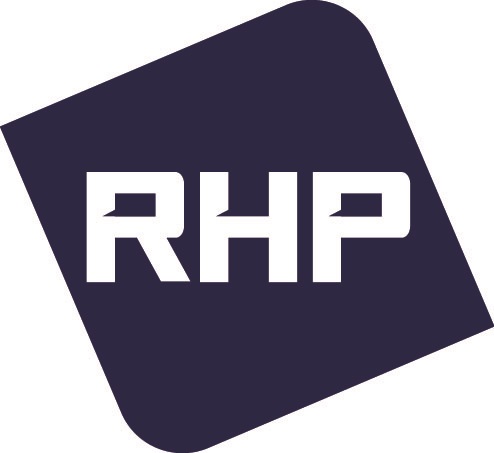 Scientific risk-based guidance and solutions you and your company can trust.
Scientific risk-based guidance and solutions you and your company can trust.
RHP Risk Management is a leader in the field of Industrial Hygiene, Indoor Air Quality (IAQ), Built Environment, Risk Management, Dose Estimation & Analysis, and Exposure Simulation Testing. Our highly trained and sophisticated team of professionals work together seamlessly on small and large projects. Our roster includes certified industrial hygienists, public health scientists, risk assessors, certified safety professionals, field staff, an engineer, an anthropologist, an economist, certified paralegals, and support staff.
We work with our clients to develop solutions to their most pressing concerns. Understanding exposures and risks through a grounding in a sound, defensible, state- of- the- art scientific approach gives our clients peace of mind. Empowered by a comprehensive understanding of exposures we can provide, clients are better equipped to recognize previously unseen business risks, manage known risks, target areas for control systems, comply with regulations, and to be braced for regulatory or litigation actions. Senior staff have served as experts in front of stakeholders, public, workers, regulatory, and State and Federal courts.

